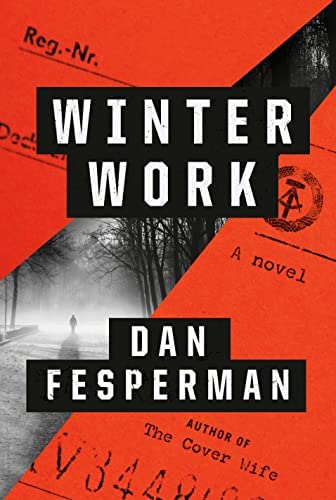
Spy stories set in Berlin during the Cold War are one of the staples of espionage fiction. In fact, they may account for a major share of the books published about spies and spying in the English language. Most explore the behind-the-scenes war between the West and the Eastern Bloc before November 9, 1989, when the Berlin Wall came down. A growing number of authors have set their stories in the years since. But I’ve come across few that address the fraught few months immediately following that epochal event. Then, the spymasters of East Germany’s legendary Stasi, its Ministry for State Security, were suddenly out of jobs. That’s the setting for Dan Fesperman’s spell-binding novel of intrigue in East Germany, Winter Work.
Estimated reading time: 5 minutes
A murder sets off the action
The book opens in February 1990. Fifty-seven-year-old Emil Grimm is “a professional keeper of secrets” with decades as an officer of the HVA, the foreign intelligence service of the Stasi. A colonel, he’s currently number six on the CIA’s list of its top ten targets for recruitment. With his beloved wife Bettina, now “locked in” with ALS, he is holed up in their dacha outside Berlin, awaiting his last paycheck and fearing arrest by the West German government.
On a walk through the hilly countryside, he comes upon a team of the Stasi’s secret police examining a corpse by the side of the nearby lake. The body is that of Emil’s neighbor and friend, Lothar Fischer. Suddenly, a lieutenant in the Volkspolizei—”cops, not secret police”—arrives on the scene and, to Emil’s astonishment, persuades the Stasi men to leave. Clearly, the balance of power in East Germany has shifted. And that offers Emil hope as he sets out to learn who murdered his friend.
Winter Work by Dan Fesperman (2022) 352 pages ★★★★★

Spy fiction at its very best
Emil cleverly plays off the Volkspolizei lieutenant against the once-powerful secret policeman he’d discovered at the murder scene, involving them both in advancing his investigation. In the events that unfold in subsequent months, we learn that Emil’s interest in learning why Lothar was murdered is a very personal matter. A neighbor, Markus “Mischa” Wolf—his former boss, “the Stasi’s most renowned spymaster”—becomes involved, adding an element of danger. As does the CIA, which had sought to buy from Lothar a list of the names of all one thousand Stasi agents working throughout the West.
The action is propulsive, and Emil’s survival is always in doubt. “He had run agents and operatives from afar . . . Yet Emil himself had never once made a brush pass, chalked a mark onto a tree, cleared a dead drop, or called for a crash meeting.” And that puts him at a great disadvantage when the KGB arrives on the scene in league with the East German secret police. This is spy fiction at its very best. No one I’m aware of has done a better job of portraying intrigue in East Germany.
The historical basis for the novel
Once you’ve finished this novel, be sure to read the Acknowledgments at the end of the book. There, Fesperman reviews the historical basis of his story, which is eye-opening. I won’t spoil the tale for you by recapping it here. Suffice it to say, that despite how unlikely some of the events that transpire in the story might seem, history tells us otherwise.
About the author

Here’s what Dan Fesperman writes about himself on his author website: “Dan Fesperman first began writing about dangerous and mysterious people and places as a journalist, a newspaper career that culminated in his years as a foreign correspondent for the Baltimore Sun. Reporting from Europe and the Middle East, he covered three wars while also finding the time to write his first three novels. [Fesperman] then quit the newspaper biz to write fiction fulltime, and now travels on his own dime.
“He grew up in Charlotte, NC, and, as a graduate of the University of North Carolina at Chapel Hill, is a diehard Tar Heel. He is married to the journalist Liz Bowie, and they live just north of Baltimore. Their two children have moved off to adventures of their own.”
Fesperman adds in his Acknowledgments that “I wouldn’t have been nearly as comfortable with all this material if I hadn’t lived and worked in Berlin from 1993 to 1996, only a few years after this novel is set.”
For more reading
See my review of the author’s terrific earlier novel, The Letter Writer (Nazi saboteurs, the Mafia, and crooked cops).
Paul Vidich has written a brilliant novel about the East German spymaster Markus Wolf in The Matchmaker: A Spy in Berlin (A dangerous spy game in Berlin before the fall of the Wall).
You might also enjoy my posts:
- The 15 best espionage novels
- Good nonfiction books about espionage
- The best spy novelists writing today
- Top 10 mystery and thriller series
If you read spy thrillers, consider dipping into the work of these other excellent authors:
- Joseph Kanon’s spy thrillers are superb
- Following Mick Herron’s clever British spies at Slough House
- Dame Stella Rimington’s Liz Carlyle series of top-notch espionage novels
- The evocative Night Soldiers series from Alan Furst
And you can always find my most popular reviews, and the most recent ones, plus a guide to this whole site, on the Home Page.


























